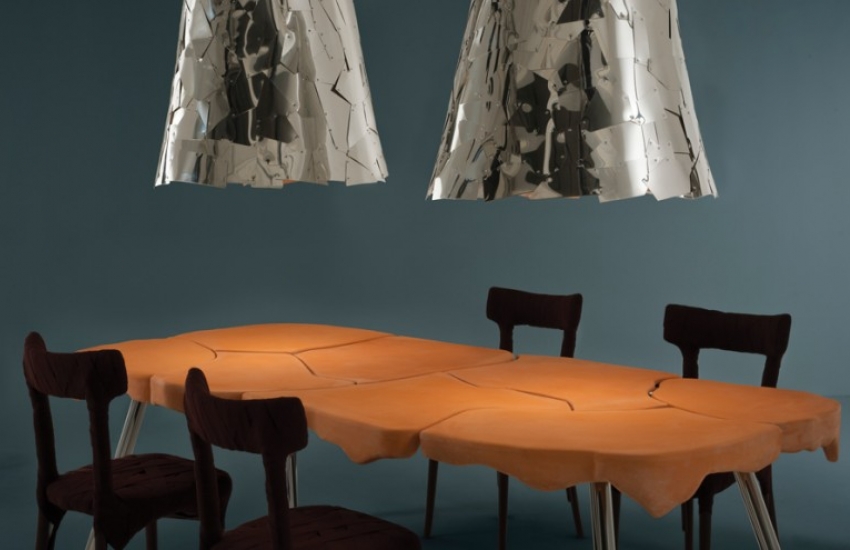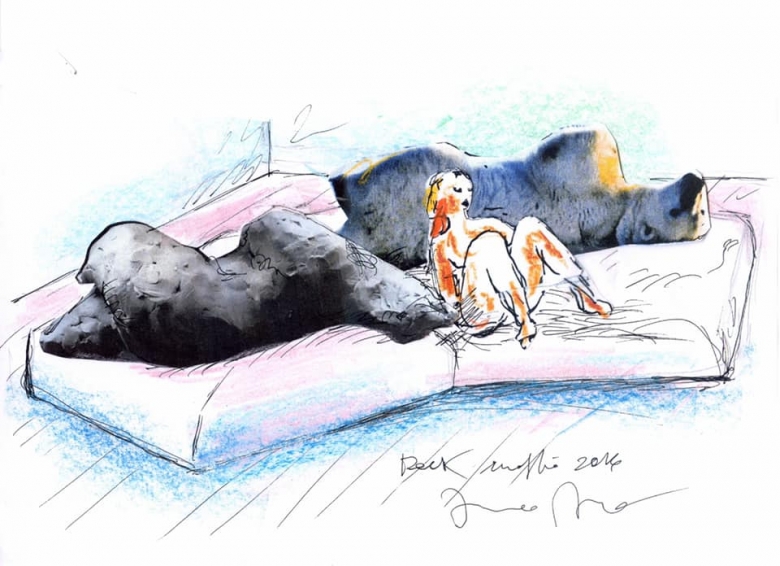當萬物為一:Francesco Binfarè 談自然
1997年,時任 Edra 創意總監,也是義大利激進設計運動大將之一的 Massimo Morozzi,因為在雜誌上看到獨特的 Vermelha 繩索單椅,發掘了來自巴西的 Campana Brothers,從此結下不解之緣。如今 Vemelha 單椅已經成為多個現代美術館收藏的單品,Campana Brothers 更從此躍升成為世界一線設計師。
這裡收錄了十三年後的二月某一天,Massimo Morozzi 與 Fernando Campana 的一段日常電話。在這段看似稀鬆平常的對話中,您可以一窺兩個豐沛的創意靈魂如何彼此激盪,在輕鬆幽默的交流中,醞釀出彼此下一段創作的火花。
********************
Massimo Morozzi: Hello? Can you hear me?
Fernando Campana: Now I hear you fine.
Massimo: I can hear you… Hi… Hello?
Fernando: Hey, how are you? Everything okay?
Massimo: Absolutely. And you?
Fernando: We just got back from Paris and now, Friday, we’re going on vacation.
Massimo: Where are you going?
Fernando: First to Brotas and then to Recife. I’ll be back on 5 January, then part of the studio staff comes back on the 10th, then everyone on the 17th. In any case, we’ll be on vacation from 17 December to 17 January. How about you? Where will you go?
Massimo: I’ll be staying here in Bolgheri.
Fernando: Okay, and we’ll be there on 27 or 28 January.
Massimo: Of course. We here at Edra will get the prototype for the armchair ready and then we’ll get together.
Fernando: Good, I just wanted to plan where we could stay if you’re going to do that party on the 29th in Bolgheri.
Massimo: I’m organising everything for you. Don’t worry, I’ll take care of it.
Fernando: Because then we’re heading to Venice.
Massimo: Fine, then you’ll leave for Venice afterwards, okay?
Fernando: Sounds good.
Massimo: So listen, this weird South African thing… Hello? We’ll record everything we say, then we’ll do a transcription and fix it up a bit, then I’ll send it to you.
Fernando: Perfect.
Massimo: I’ll send it by email even though you’re closed. Do you get email while you’re away?
Fernando: Yes, in Brotas. Could you please cc everything to Humberto and Claudio?
Massimo: No problem. So…
Fernando: It’s hot and humid here. I see that you’re in a killer freeze!
Massimo: Ah! We’re cold and you’re hot, so let’s talk about the weather! What are we supposed to be talking about, I’m not clear on that?!
Fernando: Hahahaha...
Massimo: They’re asking about the future of design. Do you have any idea of what the future of design is? I don’t!
Fernando: Me!? No, the future of design…
Massimo: Hahaha! What is it?
Fernando: It’s the climate; it’s climate change… hahahaha.
Massimo: Climate change! Haha, it clearly depends on the temperature then?
Fernando: On the temperature, on how badly the planet is ruined… No, seriously.
Massimo: Go ahead.
Fernando: I see the future as more cinematographic, more theatrical, because we’ve absorbed everything and now we just have to provide a bit of a story. Put characters on the theatre stages of the home.
Massimo: Certainly.
Fernando: In order to change.
Massimo: Hey, Fernando, when they called me from South Africa, I remembered that time when we were on a helicopter. Do you remember?
Fernando: HAHAHAHA!
Massimo: And we were about to die? WE WERE ABOUT TO DIE! HAHAHA!
Fernando: …hahaha… What a catastrophe for the design world.
Massimo: It was a catastrophe!
Fernando: …HAHAHA…
Massimo: Okay, for the South Africans reading this, I’ll summarise the story: we climbed aboard a helicopter for a scenic flight over the Cape, and the pilot was a blonde woman. She started the engine and it started thrumming, vum vum vum, until at a certain point a yellow light came on and began beeping.
Fernando: Good thing we were still on the ground!
Massimo: And the girl said, “Sorry, it doesn’t work!” Doesn’t work? Shit, are you kidding me?
Fernando: Good thing that this “beep beep beep” happened on the ground and not over the Cape of Good Hope.
Massimo: We’re worrying about the future of design, and they were practically about to kill us!
Fernando: Imagine this “beep beep beep” over the ocean, like a flashing light going “Shit shit shit!”
Massimo: Hahaha! “IT IT IT” and she shakes her head, “Sorry, it doesn’t work”. Now you’re telling me!? Anyway, listen I like this idea of the cinematographic dimension. I’ve always said that design is a sort of fiction, at least the way we experience it. They’re stories that narrate something. All of the projects we’ve done together have stories behind them, no?
Fernando: They’re a dramatic script in both presentation and material, very powerful.
Massimo: Absolutely. I’m thinking of the story of the crocodiles, of the Pantanal, of these horrors that…
Fernando: I wanted to be an actor, and this makes me think that my furniture is a procession of all the characters that I never played because I didn’t have the talent to be an actor.
Massimo: Fernando, you made a mistake – what a shame, we probably lost a great thespian. But instead there emerged this curious approach to design based on stories. Remember the story of the precious stones of Brasilia? (*註:Brasilia 是 Campana Brothers 為 Edra 所設計的一系列拼貼鏡面桌子)
Fernando: Yes.
Massimo: We spent so much time on that, but then it seems to me a great thing because in the end, all these things are transformed into concrete objects that people can touch, cohabit with. This is important.
Fernando: It is.
Massimo: We’re talking about thousands of kilometres of distance. Everything’s digital here, it’s all fake.
Fernando: It’s all digital, which makes me feel strange.
Massimo: Hehehe.
Fernando: But you said something earlier about how people, when they see these stories, this theatre script that we create, they continue to recount them. For example, this new barbarism. In Paris, I’m hearing people refer to Cabana as a barbarian. (*註:Cabana 立櫃由 Campaba Brothers 為 Edra 所設計,擁有以仿蘆草纖維覆蓋的奇特外觀)
Massimo: This stuff about barbarism has stirred up a lot of talk. It’s interesting to everyone, makes them curious, and these are the keywords, the forces that launch an object, that invite people to think and, yes, to identify with the objects and recite their part.
Fernando: And to think in terms of a vocabulary that’s much more than just a sales catalogue. For example, people are referring to Cabana as barbarism, not Cabana. It’s strange, because in Paris I heard a lot of people talking about this product using the words from the catalogue, as if it were a theatre script.
Massimo: Interesting.
Fernando: …with the names of the characters, or even just their personalities.
Massimo: This is very interesting, and emerges both because there are these keywords, in this case barbarism, and also because objects like Cabana are creatures, living beings in some way, and this is very interesting.
Fernando: I was passing by Silvera on my way to the Musee D’Orsay.
Massimo: And?
Fernando: And I saw Cabana in the middle of Paris. I didn’t know that Silvera’s shop was there.
Massimo: Ah.
Fernando: And it almost startled me. I said to myself, what is this thing? It’s strange to see these real beings in the Parisian landscape. I wanted to put them out in the street, in a square.
Massimo: That would have been great. We’ll see if we can…
Fernando: To create places for bicycle parking, to sell stuff, to create a little kiosk where people can stay, where they sell penguin ice-cream bars. Imagine a penguin coming from inside the Cabana, haha!
Massimo: You could make a little tribal village in the courtyard of the Louvre, with penguins exiting from the Cabanas and entering the pyramid.
Massimo: Okay. Listen, where in God’s name is Humberto?
Fernando: Humberto went out with Ana Paula for an appointment.
Massimo: Ah, so I won’t get to say hello.
Fernando: He’ll be back in an hour or two.
Massimo: Alright then.
Fernando: And I’m going out for lunch.
Massimo: Will you give him my regards? Hello?
Fernando: I can hear you, Massimo. This is very strange…
Massimo: Maybe we’ll call to exchange holiday greetings, okay?
Fernando: Okay, when he gets back this afternoon, I’ll call you. We’ll be here all afternoon; we’re in the studio until Thursday.
Massimo: Okay, I’d like to say hi to him. And to your mother as well.
Fernando: She’s doing well. When I get to Brotas I’ll tell her. You’re all so white. I can see the cold, you in the factory wearing two jackets.
Massimo: No, no, I’m exaggerating. Though it is cold, but beautiful too. There’s the sun and design, eh?
Fernando: I had to walk through four feet of water in Venice every morning to go to work at Venini. It was a nightmare, every day till noon this deep freezing water, so cold that even with the right boots your feet would freeze.
Massimo: These are the perils of design. It’s a very dangerous profession.
Fernando: In São Paulo as well, with all these changes. Yesterday there was a storm, a downpour, you can’t imagine. It took me nearly an hour to travel less than a kilometre home.
Massimo: Hmm.
Fernando: The summer storms are definitely arriving.
Massimo: So…
Fernando: Give my best to everyone, and thanks for your wishes for my mother. Give yours mine!
Massimo: Bye.
Fernando: Bye.









